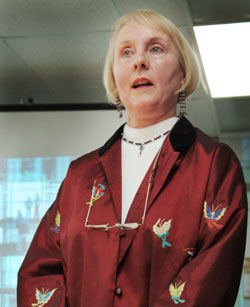Karin Doerr on presenting Canadian feminist research in China

Karin Doerr recently discussed her travels to China at the Simone de Beavoir Institute, where she is a research associate. Her trips allowed her to present feminist research at different institutions.
Photo by kate hutchinson
On April 7, Karin Doerr, research associate at the Simone de Beauvoir Institute, shared her experiences as a feminist scholar visiting China.
Wearing a red silk Chinese blouse, she talked of a fascinating country full of contradictions, where the push towards Westernization coexists with traditional ways of life.
As the audience drank green tea and ate rice crackers and fortune cookies in the lounge of the institute, Doerr showed photographs of the Great Wall and other attractions.
On her trip, made last April, she toured several universities, including the National Women’s University of China in Beijing. She gave lectures on Canadian women’s literature and feminist research in Canada, and distributed information on Concordia’s women’s studies centre, the Simone de Beauvoir Institute.
She took part in local campus life, spending time with students and professors, attending classes, and giving workshops and lectures. Doerr said the Chinese want to learn more about foreign cultures, especially the West.
At her farewell party, she said, “I was the only non-Chinese woman present and the only one to be wearing a traditional Chinese blouse.” She was surprised that the menu included Pringles and Coke rather than noodles and tea.
Upon leaving, she wished she could go back. The opportunity arose soon after. Doerr and her husband, film professor Gary Evans, were invited to an international symposium to commemorate the 60th anniversary of the end of World War II in Nanjing.
In August 2005, the couple boarded a second plane to China, but Doerr’s experience this time was totally different.
She found herself the only female presenter at the conference. Her lecture tackled women’s responses to the Holocaust, one of her fields of expertise. “I was expecting a scholarly exchange, but there were no other women there.”
The only other scholar who addressed women’s issues was her husband. He gave a lecture on Canadian representations of the Nanjing massacre in 1937, when the city, which was then the capital of China, fell to Japanese troops.
Doerr said there is a need for a greater exchange of ideas about feminist theories and practices in China, including attitudes to atrocities.
However, her work did not go unnoticed. Deng Nanzi, a student who had worked as interpreter for Doerr during her first trip, wrote to her saying that he had become interested in the idea of feminism thanks to her lectures.
“The feminists are known to love to have quarrels with men and to revolt against female traditional roles. However, is feminism really so ugly and valueless?” Deng wrote in an email Doerr read aloud.
“Because the society is like a web formed by male strings horizontally and women strings longitudinally, both are essential to the web.”